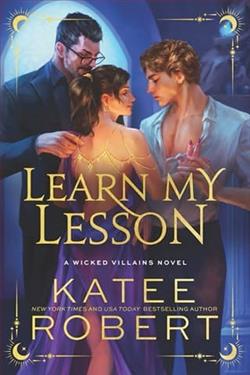Page 13 of Britta & the Beach Boy
Her eyes go big. “Five am? That is aggressive. I don’t want us to go either,” she says firmly.
“It’s not that early.” I head up the steeply rising street, looking over my shoulder to make sure Stella is following. “And like you said, we can do whateverIfeel like, right? And tomorrow I feel like slowing down and relaxing on the beach while watching a surf contest.”
Stella drops her head more dramatically than her four-year-old niece when she has to go to bed early. “Fine.”
I grin and pick up my pace. The air hangs heavy with a briny, ocean smell, but under it I can smell an amazing brew. I can tell we’re getting closer to our destination by the people streaming by, coffee cups in hand, smiles spread across their faces.
One block later and a left turn on a side street, we find the pot of gold at the end of the rainbow.
Annie’sis the cutest coffee shop I’ve ever seen—aside from mine, obviously. Painted blue on the outside, it’s an old beach cottage that’s been transformed into a bakery and coffee shop. A line of people winds out of a weather-worn wooden door that looks original to the house. Flowers peep out of window boxes, also adorned with pinwheels that spin slowly in the gentle breeze.
I take it all in, but the thing that holds my attention the longest is a chalkboard sign under a white-shuttered window that saysHelp wanted to train staff. Experience necessary.Taped to the board is a flyer, and I step closer to read it.Annie hires people who are experiencing homelessness. She trains them here, then helps them get jobs at other coffee shops and works with housing agencies to find them shelter.
“Don’t even think about applying for a job here,” Stella warns as we get in line.
“What? I’m not thinking about anything.” The fact I’m still staring at the sign gives me away before I finish my sentence, but I can’t stop myself. The wordhelpcalls to me as much as the story of what Annie is doing.
Stella snaps her fingers in front of my face, breaking the sign’s hold on me. “Hello? Come back to me, Britta.”
“Sorry.” I shake my head to clear it, but that doesn’t keep my eyes from sneaking back to the sign.
“Britta…” Stella warns.
“Stella…” I mimic her tone exactly. She rolls her eyes, which I answer with an eye roll of mine before letting out a sigh. “Look, I’ve spent nearly five years not only helping Mom with her illness, but also all the people I love most with their businesses. I can’t take a vacation from being a helper. It’s part of who I am, and this sign feels like a sign. I could train people to make coffee while I’m here. That’s something I coulddoinstead of spending the next six weeks stewing overBritta’s.”
“Let me explain how vacations work.” Stella takes me by the elbow and moves us both forward with the line.
I pull my arm back and shoot her a bored look, which she ignores.
“People—normalpeople—go on vacation tonotwork. That is the foundation of every vacation—the very core, even—notworking.” Stella wags her finger every time she emphasizesnot.“Now, granted, sometimes people have to do work on vacation—like I’m doing for Georgia with her social media accounts.”
“Have you got a point, Stella?” I tap my foot and stare her down.
“Yes. I’m so glad you asked, because this next point is the most important element of a vacation.” She hinges forward, rising to her toes to meet my eye. “Getting anewjob, while on vacation, doing the same thing you do at your regular job, not only defeats the whole purpose of a vacation, but actually—in a cosmic, butterfly-effect kind of way—undoes vacations happening across the world.”
“I’m not thinking about getting a job.” With my arms still crossed, I face the shop, away from her.
Stella scoffs. “You’re notnotthinking about getting a job either.”
“Only because I could learn some things about how another shop is run while teaching them some things, too. It seems like they could really use the help, too. This line is barely moving,” I say loud enough for the woman in front of us to glance over her shoulder.
“We passed other coffee places. Let’s just go to one of those.” Stella turns, but I don’t move.
“It’s worth the wait. I promise,” the woman says. As if in response, the line inches forward. “It’s not usually this slow, but Annie’s daughter, who works here, was in a serious accident recently.” She slides her sunglasses to the top of her head and hooks her thumb around her bag’s straps.
“Oh, no.” I glance at Stella, who gives me a stern headshake that I pretend not to see. “How hurt is her daughter?”
“Pretty bad. She was hit by a car, and the last I heard, she may be paralyzed,” the woman sighs. “Annie should really be with her, but if she closes it for more than a few days, her employees who need the paycheck she provides are at risk of being unhoused again.”
“Why are there so many homele—” at her raised eyebrow, I correct myself. “Unhoused people in LA? That sounds naïve to ask. I hope it’s not offensive. Is it because it’s warm here?
I asked the same question yesterday when Stella and I drove around downtown LA, through entire blocks with tents and pieced-together shelters set up on both sides of the street. Neither of us had an answer other than California doesn’t get very cold, so it’s easier to be outside most of the time, but that seems too simplistic.
“I’m Britta, by the way.” I hold out my hand, which she shakes. “This is Stella.”
“Karen.” She returns Stella’s wave, then faces me. “Warm weather makes it less dangerous for people to sleep outside, but very few people choose to be unhoused here because the weather is nice. There are dozens of reasons LA has a problem keeping people housed that have nothing to do with the weather. High-priced rent and low wages, addiction, lack of mental health care, other states offloading their own unhoused people on California, just to name a few. There’s no one solution that will solve the problem.”
We move forward with the line, and I ask a few more questions. It turns out Karen does free legal work for unhoused mothers in her spare time. As we enter the air-conditioned shop, she adds, “Annie is doing good work. It’s a drop in the bucket, but every drop makes a difference.”















